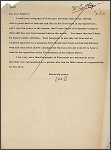
Telegram from Senator Joseph McCarthy to President Harry S. Truman
Background
On February 9, 1950, Senator Joseph McCarthy stepped into the spotlight of national attention with a speech given at Wheeling, West Virginia. McCarthy was nearing the end of his first term as senator and needed a big issue to energize his run for a second term. Holding up a piece of paper, he claimed to have in his possession information proving that more than 200 employees in the State Department were card-carrying members of the Communist Party. The charge--never substantiated--grabbed headlines at a time when friction with the Soviet Union and fear of communist subversion were growing in the country.
Fear of communism had existed since the 19th century but did not merit congressional investigation until after the Bolshevik Revolution and the close of World War I. In response to the "Red Scare" of 1919 a special Senate committee was convened. During the decade of the 1930s, governments adopted new and experimental techniques to combat the economic ravages of the Great Depression. Communist state economic planning, as well as certain Nazi and fascist economic measures, appealed to some desperate Americans. Some of the experimental programs of Roosevelt's New Deal fostered concerns that the federal government was falling under communist direction. These suspicions and fears led to the creation of a series of temporary House and Senate committees to investigate subversive threats to the government.
During World War II the United States and the Soviet Union were allies, but as soon as the war ended the two superpowers began to struggle against each other for supremacy. It was against the backdrop of this "Cold War" that the threat of internal subversion and external attack began to preoccupy Congress. Anticommunism dominated the political debates of the immediate post-World War II-era. The House Un-American Activities Committee (HUAC), established in 1938 to monitor disloyalty to the United States government, was made a permanent committee in 1945. Postwar HUAC investigators probed whether Communists and sympathizers to communism had played an active role in the labor movement, the movie industry, and the executive departments of the federal government.
In 1948, before the HUAC, professed-Communist Whittaker Chambers accused former high-ranking State Department official Alger Hiss of espionage during the 1930s. State Department and other high-level administration officials publicly defended Hiss in his denial of the charges. Then Chambers led investigators to a pumpkin patch where microfilmed secret State Department documents were hidden. The media-charged proceedings that followed and the 1950 conviction of Hiss on charges of perjury (the merits of the case are still debated today) linked Communist activity and high government officials in the minds of many Americans. This case further fueled the anticommunist hysteria in the nation.
During the weeks before McCarthy delivered his Wheeling speech, China had fallen to the Communists and the Soviet Union had tested an atomic bomb. With Alger Hiss's perjury conviction and the confession of Klaus Fuchs, a physicist on the Manhattan Project, to having delivered atomic secrets to the Soviet Union, it was clear that government security had been compromised. Particularly disturbing to average citizens was the Soviet Union's new atomic capability. Fearful Americans began to view all communists as traitors to our country. The stage was set for the freshman senator from Wisconsin.
Senator McCarthy was placed on the Senate Permanent Subcommittee on Investigations of the Senate Committee on Governmental Operations and became its chairman in 1953. At the time of his chairmanship, the jurisdiction of the subcommittee was principally the investigation of waste, inefficiency, impropriety, and illegality of government operations. McCarthy manipulated the workings of the new committee to continue sweeping accusations of communist activity in the executive branch. His 1954 probe of the U.S. Army lead to his downfall. The Army-McCarthy hearings were televised nationally, and the public recoiled from McCarthy's bullying tactics. He was censured by the Senate and died in 1957.
The featured document, a telegram from Senator Joseph R. McCarthy to President Harry S. Truman, was sent to the president on February 11, 1950, two days after the Wheeling speech. Also included is Truman's reply (probably unsent). In this telegram to the president, Senator McCarthy repeats his assertion that he had the names of 57 Communists who were working in the State Department and called upon the President to provide Congress with a full accounting of Communist infiltration of the Department, including the role of alleged Communist spy Alger Hiss in protecting security risks. In an undated (and apparently unsent) reply, the President stated that McCarthy was not fit to serve in the U.S. government, adding that the people of Wisconsin must be very sorry to be represented in the Senate by such a person.
Resources
Educational Units
National Archives and Sirs, Inc., The Truman Years 1945-1953
National Archives and Sirs, Inc., Peace and Prosperity 1953-1961
Books
Manchester, William. Glory and the Dream: A Narrative History of the United States 1932-1972. New York: Bantam, 1974.
Rosenberg, Norman L. and Rosenberg, Emily S., In Our Times: America Since World War II. Englewood Cliffs, NJ: Prentice Hall, 1991.
The Documents
Telegram from
Senator Joseph McCarthy to
President Harry S. Truman

Click to Enlarge
View Pages: 1 | 2 | 3 | 4 | 5 | 6
Harry S. Truman Library
The Papers of Harry S. Truman:
President's Secretary's Files
ca.12/1930-ca.03/1955
National Archives Identifier:
201514
Reply from
President Harry S. Truman to
Senator Joseph McCarthy
(Probably Unsent)

Click to Enlarge
Harry S. Truman Library
The Papers of Harry S. Truman:
President's Secretary's Files
ca.12/1930-ca.03/1955
National Archives Identifier:
201514